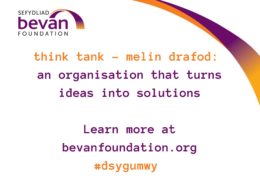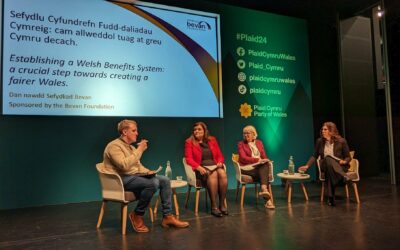 Bevan Foundation
Bevan Foundation 
Victoria Winckler reflects on a recent report for WISERD on think tanks in Wales.
Think tanks are not loved by many people. The words typically associated with think tanks are enough to make any think tank staffer wince: terms like ‘political dark money’, ‘shadowy’ and ‘shady’, hired guns and ‘second-hand dealers in ideas’ all litter the media and academic studies alike.
There’s not even much consensus about what a think tank is. Does a university research institute count? A political party’s ideas team? Campaigners in a charity? Or only free-standing, charities that seek social change?
I was blissfully unaware of much of this debate until last summer when we were commissioned by the Wales Institute for Social and Economic Research, Data and Methods (WISERD). As part of their work on civil society in Wales, we looked at the rise and role of Welsh think tanks.
 What I found was that Wales’ think tanks – of which there are at least eight – have been remarkably free of the tarnish that affects UK-wide bodies. Most were transparent about where their funding came from, and were clear about their agenda, operations and impact. If they had a particular ideological stance or link with a political party, they said so.
What I found was that Wales’ think tanks – of which there are at least eight – have been remarkably free of the tarnish that affects UK-wide bodies. Most were transparent about where their funding came from, and were clear about their agenda, operations and impact. If they had a particular ideological stance or link with a political party, they said so.
I also found that Wales’ think tanks reflect Welsh civil society more generally: there is one, relatively large, partly-government-funded think tank, the Wales Centre for Public Policy. There are several that are barely surviving and indeed may now be moribund. And in the middle are two freestanding, independent and charitable think tanks that have staff and produce regular output, albeit on tight budgets. That’s ourselves, and the Institute of Welsh Affairs.
Despite the fuss about transparency, think tanks do make a contribution to public policy around the world. Indeed they are argued to be a vital part of the development of emerging economies, from Asia to Africa and India. They offer evidence-based policies which are rooted in local circumstances, encouraging good practice.
The same can be said of Wales: think tanks provide a space for debate and the identification of new issues; they hold government to account; and they develop new policy ideas. Quite how well this has gone down with the Welsh Government over the years is a moot point – my experience is that the current administration is both more willing to accept challenge and more open to new ideas. Our own proposals for new taxes and for the possible devolution of benefits were initially dismissed, yet are now being pursued as part of mainstream policy.
It is often said that Welsh policy and politics is ‘predictable and boring‘, ‘unambitious and managerial‘ and in need of ‘bold, brave action‘. However these bold, unpredictable and ambitious ideas don’t come out of the ether. They come from people, coming together to share experiences and tease out what needs to change. They may or may not be informed by academic theory and evidence, but they almost always come from people identifying what’s wrong in their lives and what they want done differently.
Think tanks are well placed to do precisely this. We listen. We bring people together. We explore. We refine. And we pitch.
If we want a Wales with big, bold and brave ambitions, that is exciting and radical not boring and managerial, then people need to invest in the organisations that help to deliver this – think tanks. You can support the Bevan Foundation here – and other think tanks are available.
The report on think tanks is available here
Victoria Winckler is Director of the Bevan Foundation


